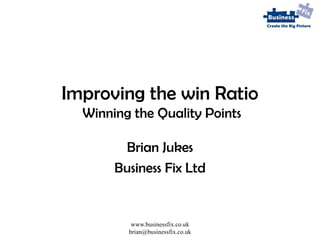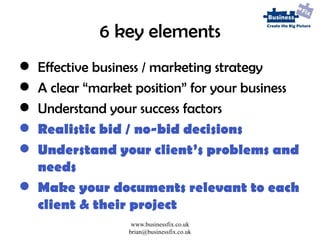Bidimprove[2]
- 1. Improving the win Ratio Winning the Quality Points Brian Jukes Business Fix Ltd
- 2. Winning the Quality Points More successful bidding processes ŌĆō more work less effort Tools to reduce the cost of bidding and raise your success ratio to 1:3 Involved with procurement since 1980 and an industry marketing expert Helped clients win over ┬Ż2bn of contracts in last 5 years As a direct result of the support offered, we have increased our market share from c.35% to an estimated 60% at the start┬Āof this year. ŌĆØ Gordon Lindsay, Projects Director, Scott Wilson Railways
- 3. 6 key elements Effective business / marketing strategy A clear ŌĆ£market positionŌĆØ for your business Understand your success factors Realistic bid / no-bid decisions Understand your clientŌĆÖs problems and needs Make your documents relevant to each client & their project
- 4. Bid / no-bid Decisions Man who chases 2 pigs catches neither of them! Chinese proverb
- 5. Why Bid / No Bid Better use of resources Saves money More effort dedicated to relevant bids More wins Builds credibility
- 6. Why bid / no bid 3 failed to provide the requested financial information 4 did not detail available resources 4 had an annual turnover significantly less than the estimated value of a 3 month contract 19 failed to demonstrate experience in at least one key area 3 failed to demonstrate any experience relative to the contract
- 7. Survey of Bidding Costs (Reading University) Small to Medium 40 Hours (┬Ż100/hr) ┬Ż4000 Win Rate 1:6 Internal cost to win a project ┬Ż24,000 Medium to Large 136 Hours (┬Ż81/hr) ┬Ż11,000 Win Rate 1:5 Internal cost to win a project ┬Ż55,000
- 8. Cost of bid Opportunity cost Formal meeting Look at fit to the business Team available to prepare and manage bid Look at relationships ŌĆō do you have any? Do you understand the clientŌĆÖs decision making process? If in doubt ŌĆō go with your instinct Decision making
- 9. What do you need to make Bid / No-bid Decisions Pre-bid discussions Understanding clientŌĆÖs business Assess the project fit to your business Overall strategy Type of work you want People you want to work with Match to success factors Which jobs go best
- 10. What then? If no ŌĆō contact client and offer suitable explanation If Yes Manage the process for success Identify the clientŌĆÖs real needs Create value for the client It is a project, manage it that way
- 11. Understand your clientŌĆÖs problems and needs
- 12. Time spent bidding Extract from ŌĆ£True cost of competitive biddingŌĆØ ŌĆō W Hughes Univ. of Reading
- 13. Who Does This? Start with the company history Use your name at the start of paragraphs Add all available material just in case it is relevant Include company statements without showing why they are relevant Offering a commodity service ŌĆō same as the next guy
- 14. Understanding ClientŌĆÖs problems and needs Develop a relationship What is the clientŌĆÖs problem or need Use ŌĆśso whatŌĆÖ 5 times Express it in their terms Why is it a problem What outcomes do they want Which outcome has highest priority Identify clientŌĆÖs personal risks
- 15. Seven Key Questions What is the clientŌĆÖs problem? Why is it a problem? What objectives for a successful solution? Order of importance for objectives? How can we solve the clientŌĆÖs problem? Outcomes for each solution? Which one is best?
- 16. Why did you not win? Winner was too cheap They moved the goalposts They were always going to choose them We didnŌĆÖt want this job anyway They remember the Courthouse job The client didnŌĆÖt know what they wanted MugginŌĆÖs turn
- 17. Why did we not win We were the same as the others Our bid missed the mark We didnŌĆÖt establish credibility We didnŌĆÖt really know what they wanted We didnŌĆÖt understand the client We failed to manage the process We didnŌĆÖt offer anything different
- 18. Customer need Recommend an Ideal Solution How we can deliver Why us Persuasive Paradigm Tom Sant Sant Corporation 1 2 3 4 Make your proposal relevant to each client and each situation
- 19. Improving the win Ratio Winning the Quality Points Brian Jukes Business Fix


















